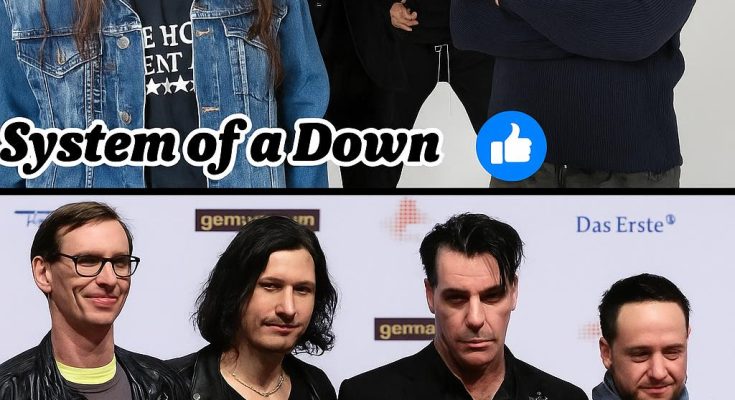“System of a Down isn’t just a band” is more than a catchy phrase — it’s a statement about how this quartet from Glendale, California transformed heavy music into a global voice for the restless, the alienated, the political and the proudly different. Formed in 1994, the group — fronted by Serj Tankian (vocals/keys), with Daron Malakian (guitar/vocals), Shavo Odadjian (bass/backing vocals), and John Dolmayan (drums) — merged furious riffs, Armenian folk inflections, odd time‑signatures, and uncompromising lyrical content to create something that defied genre and expectation.
What made System of a Down resonate so deeply across borders was the way their sound and message aligned with global discontent. In the late 1990s and early 2000s, young people were looking for more than packaged angst: they wanted authenticity, urgency, and anger with meaning. System of a Down delivered all of that, and then some.
Their debut, System of a Down (1998) brought them into the metal‑alternative world with tracks like “Sugar” and “P.L.U.C.K.” — the latter a fierce indictment of the denial of the Armenian genocide. They didn’t shy away from their heritage, but they also refused to be reduced to it. They were not “the Armenian metal band,” but rather a band whose Armenian roots informed a broader, explosive world‑view.
Then came Toxicity in 2001, debuting at number one on the Billboard 200 and containing songs like “Chop Suey!” and “Aerials.” At a time when rock was being homogenised, System of a Down were anything but standard. They intertwined aggressive metal with Middle‑Eastern melodies, punk energy, rap‑metal grooves, and Serj’s haunting falsetto. They tackled issues of war (“B.Y.O.B.”), prison systems (“Prison Song”), media overload (“Sugar”), existential crisis (“Aerials”), and political manipulation — all while making noise that simply felt exhilarating.
What does it mean that they became “the global voice of the restless”? It means several things:
Firstly, they gave voice to the disaffected. Whether you were angry at governmental corruption, frustrated with societal hype, mourning ancestral violence or simply trapped in your own head, System of a Down spoke with urgency. Their audience spanned teenagers who felt mis‑understood, political activists who found an unexpected ally, and music fans who craved something outside the polished mainstream. Reddit threads still testify to this:
Secondly, their sound crossed boundaries. It wasn’t strictly metal, nor punk, nor solely alternative rock — it was a hybrid. That hybridity allowed them to reach wider audiences. Their songs could be studied for political message, moshed to for catharsis, sung along to for sheer energy. As one commenter put it:
Thirdly, their politics were intrinsic, not accessory. From the beginning, System of a Down were unabashedly political. Songs like “P.L.U.C.K.” referenced the Armenian genocide; “B.Y.O.B.” railed against war and the “obvious” lies; “Prison Song” attacked the U.S. prison system. (EBSCO) Their activism extended beyond lyrics: they refused to play in Turkey, citing the government’s refusal to recognise the Armenian genocide. (Wikipedia) That solidarity and conscientiousness gave them moral weight as well as musical weight.
Fourthly, they were both serious and absurd — a rare combination. A track could shift mid‑song from a quiet melody to monstrous riff to oriental motif to screamed scream, and then you’d have Serj singing “Father, why have you forsaken me?” with Malakian cutting in with a machine‑gun riff. That unpredictability mirrored the chaos of the world they were responding to. It also made their music both emotionally immediate and intellectually engaging. Pitchfork noted that Toxicity’s mix of heavy riffs and “bait‑and‑switch” songwriting elevated the band beyond the formulaic rock of the era. (Pitchfork)
Fifthly, their identity mattered. Being Armenian‑American, from the Los Angeles diaspora, fed into a sense of being “between worlds.” That liminality could be heard in their music — the pull of heritage, the pressure of assimilation, the rage at historical injustice, and the desire to be louder than invisibility. Their refusal to be defined solely by that identity made them accessible globally, to people who themselves felt between cultures or silenced. The band themselves said that their Armenian heritage “indirectly and in a very deep way plays a part in everything we do, but it’s not as big as people usually make it.
And so they became a kind of global voice: a band whose music was loud enough to be heard across continents, whose message struck chords in disparate places, and whose roots gave them an authenticity that mainstream bands lacked. They sold millions of records worldwide. Index) They weren’t just another nu‑metal band; they were something else — unpredictable, bold, urgent.
Yet their story isn’t only triumph. By the mid‑2000s, internal tensions, creative differences and burnout took their toll. After two back‑to‑back number‑one albums in 2005 (Mezmerize and Hypnotize), the band went on hiatus in 2006. They reunited in 2010 but releasing new full‑length albums has remained elusive; apart from two singles in 2020 (Protect the Land and Genocidal Humanoidz) intended to raise awareness for the Nagorno‑Karabakh conflict, they haven’t delivered a new studio album. The absence of new material hasn’t erased their influence, though—in many ways it solidifies the moment they captured.
The legacy of System of a Down lies not only in big albums or hit singles, but in how they became a conduit for frustration and hope, for critique and catharsis. They showed that heavy music could be smart without being pretentious, powerful without being hollow, political without being moralistic — and still move you. They gave voice to the restless: those who feel displaced, angry, unheard, hybrid, diasporic. Whether you’re from Glendale, Lagos, Berlin or Bogotá, their sound spoke — sometimes screamed — across barriers.
And that is why the phrase “System of a Down isn’t just a band” rings true. They were an explosion of sound, identity and purpose. They offered global resonance to individuals yearning to say “wake up,” “look around,” “why are things this way?” They didn’t just create music to fill speakers — they created an experience, a movement. They turned rage into rhythm, memory into melody, protest into moshing.
In a world that often demands silence or simplification, System of a Down insisted on complexity, on contradiction, on volume. And for many, that voice became a part of their own.



